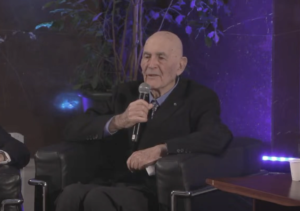500,000 students hear the story of Holocaust survivor Sami Modiano
 Four hundred Roman students in the hall and 500,000 connected remotely from all over Italy listened to the testimony of Sami Modiano, 93 years old, one of the last living survivors of the Shoah. “You must know. When I am gone, there will be more of you, and you will make sure that this never happens again,” Sami said in the main hall of La Sapienza University of Rome, responding to the invitation to speak from the university and the Shoah Museum Foundation.
Four hundred Roman students in the hall and 500,000 connected remotely from all over Italy listened to the testimony of Sami Modiano, 93 years old, one of the last living survivors of the Shoah. “You must know. When I am gone, there will be more of you, and you will make sure that this never happens again,” Sami said in the main hall of La Sapienza University of Rome, responding to the invitation to speak from the university and the Shoah Museum Foundation.
“We want this to be a contribution to the present, to consolidate a future that is fair and not torn apart by the mistakes of the past,” said Rector Antonella Polimeni, opening the meeting with the survivor born in Rhodes in 1930 and deported as an adolescent to Auschwitz-Birkenau.
The bond with Modiano is a close one, the rector then explained, citing the honorary doctorate in History, Anthropology and Religions that was awarded to him in 2013, but also other circumstances in which it was possible to work together, including the translation of his story into English under the title “For This I Lived – My life at Auschwitz-Birkenau and other exiles.”
Mario Venezia, the president of the Shoah Museum Foundation, thanked Modiano “for everything he does, without ever sparing himself.” After expressing his appreciation for the line traced by the University La Sapienza on the issue of Memory, Venezia turned to the many young people present: “Thank you for coming here, because it is your choice. I hope you can always choose between good and evil.”
In his speech, Sami recalled his deep friendship with Piero Terracina z.l.: “We had the same story. He was a boy from Rome, I was a boy from Rhodes. He had lost everyone, and I had lost everyone.” It was Piero who pushed him towards active testimony, inviting him to participate in a Memory Journey organized by the municipal administration. An event that represented a turning point in Modiano’s life. Since then, Sami has a task: to speak, to tell, to testify, “so that no one ever has to see what our eyes have seen.”
